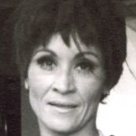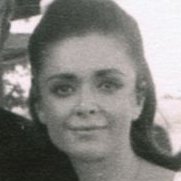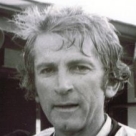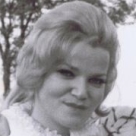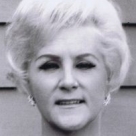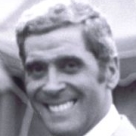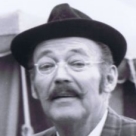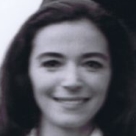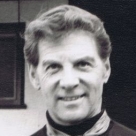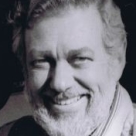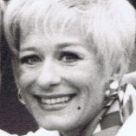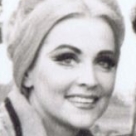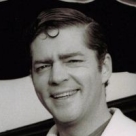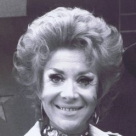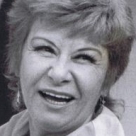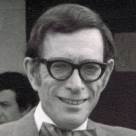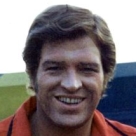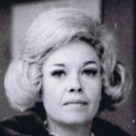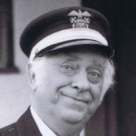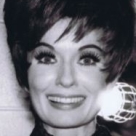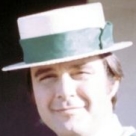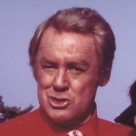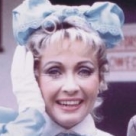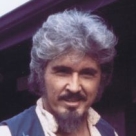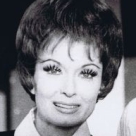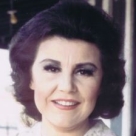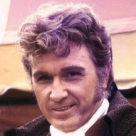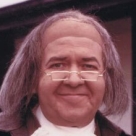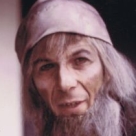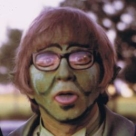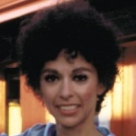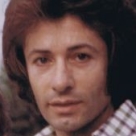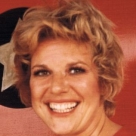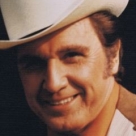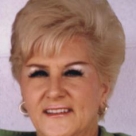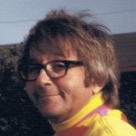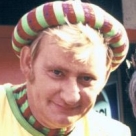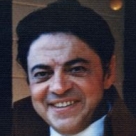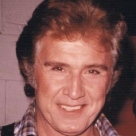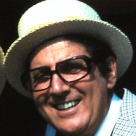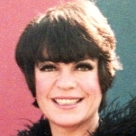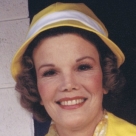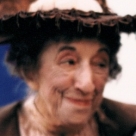The first gallery on this page contains images from two gigantic scrapbooks kept by the late Clyde Miller. Although not known for his singing and dancing abilities, Clyde played over 30 memorable roles in Melody Top productions from 1967-1979. A local who also worked at Milwaukee's Riverside Pumping Station, Clyde performed on many of the city's stages and was recognized from working in print, radio and television ads. All of these amazing, historic photographs were taken in the backstage area by his wife, Sally Marks. Please click on the images below for enlarged views!
Mr. Clyde Miller, pictured with Melody Top star...
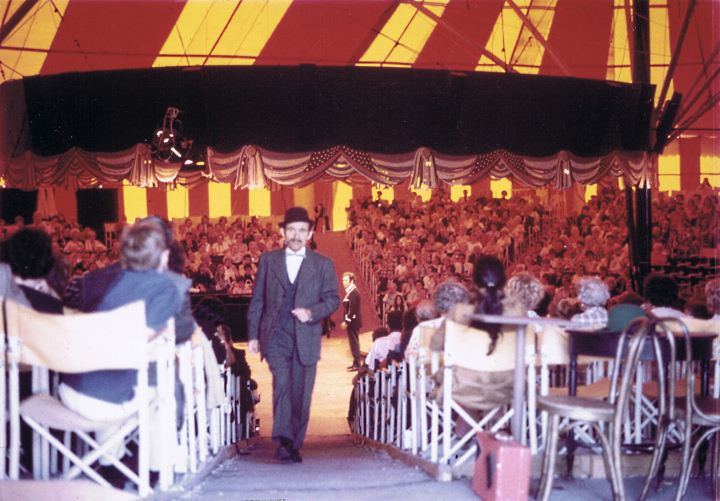
Clyde Miller, walking up one of the long, paved aisles at Melody Top Theatre, during a matinee of GEORGE M! (1971). Please note the stage chairs at the top of the aisle. Photo by Sally Marks.
Veteran character actor Zale Kessler wrote the following essay, filled with his good humor, about working at Melody Top. Between 1965 and 1976, he played dozens of comedic supporting parts. His first and last roles at The Top were the same: Sandor, the Middle-European bookmaker, in BELLS ARE RINGING. Although he appeared in countless theatrical productions across the country, Zale may be remembered by visitors to this site from his roles in Mel Brooks movies, on television shows and as the voices of many cartoon characters. Sadly, Zale passed away in his sleep on September 28, 2015. The cause of death was heart failure. He is greatly missed by those who treasure the grand tradition of American musical comedy.
Melody Top days
By Zale Kessler (Los Angeles, CA)
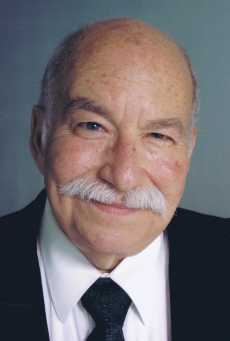
Milwaukee is a great theatre town. In the 1960s, Melody Top opened as a sister theatre to the one in Chicago, and casts would alternate shows for the summer at each venue.
Under Elmer Regner (a dour, crusty but okay guy), the company started in a meadow next to a polo field in the boonies on Good Hope Road, farmland on which they put a musical theatre in-the-round. One of a number of summer tent theatres built around the same time, they were basically all alike. A hole was dug in a big saucer shape and terraced for 1200 to 1800 seats. The stage was built at the bottom with six aisles that led to the top and outside for entrances of both casts and audiences. A light grid hung over the stage, suspended from the two iron poles that supported the tent and also formed the walls and roof of the theatre, as it was always called (not a tent).
Stuart Bishop, whom I worked with earlier in Charlotte, North Carolina, was the resident director and set designer, and Martin Wiviott took over from Elmer and became a great producer. Donald Yap was the usually jolly Hawaiian conductor who I knew from the Meadowbrook Dinner Theatre in Cedar Grove, New Jersey (that’s another story).
We were a resident company for the season which was usually a half dozen shows that ran two weeks each, rehearsing the next show while performing the current show at night. The shows were good and the theatre was wildly popular, sometimes putting out season ticket ads in January with "To Be Announced" for one or more shows, and sold out for the season in a week or two anyway. I had much fun and feel I did some good work with people who have stayed friends all this time.
One of my favorite memories is of Cole Porter's SILK STOCKINGS, which opened on a blistering over-90-degree evening with the attendant awful humidity. The show opens in a Paris hotel where a Soviet defector named Bibinski has run away from Russia. Three bumbling KGB agents have been sent to bring him back to Siberia. These were played by me and two other residents; we were all in heavy winter clothes. I wore a raccoon coat to the floor, fur mittens to the elbow, a fur Russian hat, galoshes with buckles, earmuffs and a six-foot scarf. The others were similarly dressed. The audience sat packed in and fanning their un-air-conditioned faces with their programs and sweating profusely, trying to get cool. When the three of us walked on stage with fake snow dusted on our outfits, the entire audience took one look and let out a long "Ooooooooooh!" Then they laughed and gave us a standing ovation!
Thankfully, the scene was only about five minutes long, and we raced to get out of all of that fur before we melted!
Sometimes in summer stock you would end up using local choirs for shows, like extra nuns for THE SOUND OF MUSIC or in, for example, FINIAN'S RAINBOW, a local black Gospel trio to play the Passion Pilgrim Gospeleers.
The show starred Arte Johnson as Og the leprechaun, and I was the bigoted Senator Rawkins. Dress rehearsal didn't go very well. The trio was rigid with stage fright. I could almost smell the panic. I had a scene with them and my first line was:
"Who are you?"
To which one of them was supposed to answer:
"We're the Passion Pilgrim Gospeleers; we travel around and play and sing."
I then was supposed to sing with them "The Begat" song.
I said, "Who are you?"
Nothing, just sweat and glassy looks like deer in the headlights...
I said, "Where are you from?"
Nothing said, but a notable increase in perspiration.
Finally I said, "What's your name?"
One of them finally, timidly answered: "Dwain."
I doubled over in a fit of giggles and Stuart Bishop, the director, called a break and talked to them. I don't know what he said but they were fine after that and, if I recall, got good reviews and gave them a taste for theatre they hadn't experienced. I think they did a couple of other shows around town. Hooray for Dwain!
Most stage and especially musical performers don't eat much supper before a show for fear of gastric upsets of one kind or another, preferring to find a sympathetic spot after the show for food and drink.
In Milwaukee for the season one summer, we found an Italian place that served and stayed open late to accommodate our cast of usually twenty or so. The food was great and some of the other customers, mostly middle-aged Italians who sat and had quiet discussions in corners, began to pick-up the check for our group nightly.
After a week or two of no checks, I approached the table where they sat to thank them for all of us: "We are really pleased that you enjoyed the show and thank you for picking up our checks, but this is not a cheap place and we feel you have been more than generous to us all. This must be very expensive for you."
The guy I was talking to (a twin to Tony Soprano) smiled at me and said through a wreath of cigar smoke, "Don't worry about it. Look, you know crime doesn't pay; well, we're crime."
The following account of appearing in IRMA LA DOUCE at Melody Top with Chita Rivera is from Robert Dagny, who performed the role of Bob-Le-Hotu. Today Mr. Dagny is a member of the Society of Stage Directors and Choreographers, the Dramatists Guild, AFTRA, Actors' Equity and SAG. He studied acting with Stella Adler, and his career in the theatre includes dozens of credits as a professional actor in television, film and regional theatre. In addition, he is a noted script consultant, playwright and audition coach in New York City. Please check out his informational website, The Performers Audition Package. If you are interested in his professional services, feel free to e-mail him at robert@actorsauditioncoaching.com. He would love to hear from you!
Performing in IRMA LA DOUCE with Chita Rivera
By Robert Dagny
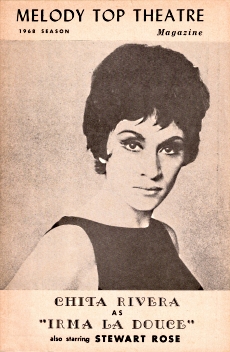
The newspaper reports of Chita Rivera's accident are mostly accurate.
What actually happened is that on opening night, June 4, 1968, of IRMA LA DOUCE, during the first act, the musical number "Dis-Donc" was about to begin. Chita, coming out of the scene and ready to start the number, ran across the stage and hugged me, joyous at the fact her character had fallen in love with Nestor (played by Stewart Rose). She then proceeded up a flight of stairs to the top of some scaffolding (that was part of the set) and began singing the song. During the number, she moved down the stairs to the landing, still above the stage. When the dance part of the number began, she had been choreographed (by Bruce Becker) to jump from the landing and to be caught by two male members of the chorus. Landing on one foot, as choreographed, she finished the number to huge applause!
Since Melody Top was theatre-in-the-round, it had been worked out that in the blackout after the number I was to assist Chita off the stage and up the aisle. As we were going up the aisle, she said to me, "Oh, Bob, I think I've hurt myself." Somehow, she finished the show and immediately afterward was taken to the hospital. She had torn several ligaments in her foot; I don't remember if it was the left or the right. She only missed one show! Chita did the next few performances in a wheelchair, and then for the rest of the run she used a cane. She was so upset — not just because of the accident — but about the audience! She said to me, "They came to see me dance, and I can't show them what I can do!" I have to add that she was a joy to work with, a "professional's professional." She was totally down-to-earth and unlike many other stars of her stature. In addition, she had been booked to do a tour of SWEET CHARITY later in the summer and was worried she wouldn't heal soon enough to be able to do it. I assume that she did get well enough to do the tour, but I am not sure.
I also remember that her performance energy was almost supernatural. If I hadn't been planted firmly on my two feet, when she hugged me, I would have been taken off-balance. It was so powerful, I could feel the energy from her. That boundless energy may be the reason why, when she landed on that one foot, it was so forceful; the freak accident was bound to happen. Chita always worked on all eight cylinders when performing. She is one of the most giving of performers, both for the audience and definitely with her fellow performers. It was one of my first really big roles in musical theatre, and she was totally supportive and helpful in so many ways. How lucky I was to work with her, one of the American musical theatre's giants!
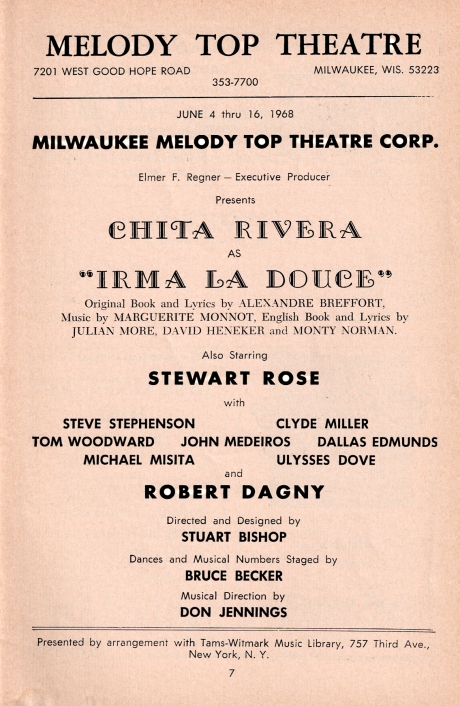
One other point: For the rest of the run, Bruce Becker, the choreographer, did the actual steps for her in the dancing parts of each number.
As for the assassination of Robert Kennedy on June 5, 1968, it was an emotional wallop that swept the entire company. But as we did the show each night, it was a tacit homage to him. It was our way to show our affection for him, since there was no other way to deal with it, and the energy of performing every night got us through the ordeal.
One final digression about the production: Stuart Bishop, the director, also designed the sets and costumes for everyone in the cast to be all black, grey and white. Only Chita was costumed in brilliant color. Every time she changed costumes, it was in another vibrant shade. It was a very effective design decision.
Luckily, the reviews were excellent, if I recall. (A side note from the webmaster: The reviews for IRMA LA DOUCE were excellent. Michael Drew of the Milwaukee Journal reported on "noble support from Robert Dagny," and he stopped the show! Chita's "expert performance" was also praised. There is no mention of the accident or her injury in the review. Only one performance, on Wednesday evening, was cancelled.)
An apprentice helped Betty White with her pre-show nerves
By Michal W. Craite (Phoenix, Arizona)
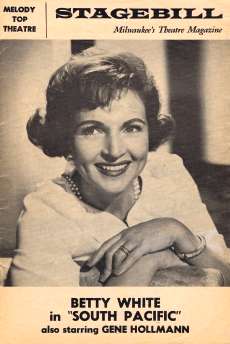
It was June of 1965, I was not quite 17, and I had just been taken on as a Melody Top apprentice. My first show was SOUTH PACIFIC, and my first night at the theatre was for the dress rehearsal. I positioned myself at the top of my aisle, next to the storage area where my first pieces of scenery were to be brought on stage during the first blackout.
As fate would have it, Betty White, who played Nellie Forbush, made her first entrance in the play from the top of that aisle. She walked around in her Navy nurse’s uniform (with high heels!) and stood there very still, looking intently down at the stage and mildly wringing her hands.
As only youth and naive friendliness could have allowed, I took the few steps towards her. She continued to stare straight down at the stage, and I whispered to her, "Are you nervous?"
Many stars about to make an entrance would have given me a cold look and pushed me away, but not her. She took one brisk breath and, her whole expression changing into a kind of comically frigid terror, turned to me.
"Am I NERVOUS?" she exclaimed and threw her arms around me in a tight hug.
I immediately stopped breathing so my ribs wouldn’t do something foolish and unprofessional (like expand) and discourage this totally unexpected burst of affection. After a few seconds, and with a sigh, she released me and regained her pose.
"Very," she affirmed in a kind of stage whisper. She continued to watch the stage, and I continued to breathe.
About a minute later, she turned her head towards me again. No, I hadn’t moved. I was still trying to emerge from the stunning thing that had just happened.
"Are you going to be standing here every night?" she asked me.
I replied, "Uh, yes."
Betty asked me a question: "Would you mind if I give you a little hug every night for good luck right before I go on? I think it would help me calm down."
I responded to the lady with wit, sophistication and composure. "Ah...ah...well, ah...yeah, I guess. I mean, I’ll be here anyway. Ah...sure...ya, okay!"
Opening night, she approached the same spot at the top of the aisle with the same tense focus. She seemed to be completely unaware of me, back in the shadows, several feet away from her. I figured that she had forgotten all about her request — and me. I didn’t blame her, as she had a much more important event facing her at that moment. I already reminded myself that she had only been trying to be nice to me the night before.
But I wanted to fulfill my half of the promise at any rate. Being ultra-careful not to distract or to disturb her in any way, I very carefully, very quietly, moved up to about a foot from her right side, and I stood very still. She continued to appear totally oblivious to my presence, her entire attention focused on the stage below, her fingers quietly intertwining with each other. Then, about three short lines away from her cue, her gaze still facing forward, she reached over and took hold of my elbow, pivoted quickly towards me, threw her arms around me and clutched me right to her.
"Thank you!" she whispered intensely into my ear. As in a flash, she turned away and rushed down the aisle, calling out her first line towards the character of Emile.
Every night of the show, that precise pre-scene played out between us. Almost every night, I wondered if she even knew I was there and every night, at the exact same moment, she would turn with no warning and hug me quickly and intensely (sometimes whispering thanks, sometimes not) and then proceed quickly down the aisle for her entrance.
Betty White was very gregarious, warm and humorous with everyone in the cast and crew, but our little ritual was never referred to by either of us during the entire run. Apparently, it was never mentioned to anyone, as I just recently told this story to someone who was at Melody Top during the same time, and with whom I have remained good friends all these years. He was incredulous: "I NEVER knew this! You have NEVER told me this."
The very last night of the run, after the show, as everyone was about to leave, she unexpectedly walked over to me, took my hand, and said with this quiet smile and voice, "Thank you so much for your kindness. You are a sweetheart."
I smiled and shrugged with my best almost-17-year-old nonchalance and said, "Oh...you’re welcome." But hopefully my eyes told her that I thought SHE was the sweetheart.
A note from the webmaster: On a television episode of PASSWORD that aired May 20, 1965, Betty White mentioned performing SOUTH PACIFIC in Milwaukee later that summer. A clip of that show is posted on YouTube.com, and she plugs her appearance at around 2 minutes and 10 seconds:
